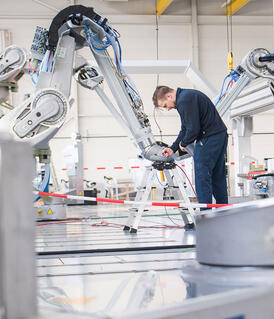Artificial intelligence: a key technology

Hardly any other technology is changing the world of work, or indeed people’s everyday lives, as quickly and fundamentally as artificial intelligence is (AI). That’s why this future field is in focus, not only in German politics but also in business and research. AI programs have long been used in many companies, and new applications are being developed at universities and by nascent start-ups. The German government supports these developments with funding programmes.
New impetus with AI Action Plan
The German government already launched an AI strategy in 2018 aimed at continually stepping up investment in this key technology. Building on this, the Federal Ministry for Education and Research (BMBF) presented an “Artificial Intelligence Action Plan” in November 2023 that identifies eleven central areas of action: from funding centres of AI excellence to the expansion of computing capacity. The BMBF alone will be investing more than 1.6 billion euros in AI in the current legislative period until the next Bundestag elections Elections Every four years, the parties stand in the general elections to the Bundestag. Traditionally, the turn-out is high in Germany, and following a high in the 1970s, when the turn-out was over 90 percent, since reunification it has been around 80 percent. 76.6 per cent of eligible voters took part… Read more › in 2025.
AI research: laying the foundation for progress
For Germany to hold a top-class position, research at universities, non-university research organisations and companies is vital. According to the Action Plan, Germany and Europe are world leaders in this field. This is based on key indicators such as the number of AI publications and citations, and the country’s contributions to the development of open-source AI software: in these terms, Germany regularly ranks among the best five or six nations.
One outstanding example of the connection between basic and applied research is Cyber Valley in Stuttgart and Tübingen, Europe’s leading centre for excellent research and innovation in artificial intelligence and state-of-the-art robotics. Tech companies work closely with universities and research institutions there.
Close cooperation in Europe
To position Germany at the forefront of artificial intelligence in the long term, the government is investing among other things in centres of AI excellence where leading research institutions collaborate on artificial intelligence. One central role is played by the German Research Center for Artificial Intelligence, which is one of the most important centres of excellence in the world of international science.
Germany is also focusing on international cooperation, especially with European states. “European and international networking is to become a hallmark of the German AI ecosystem,” states the AI Action Plan.
Business success with AI
The German start-up scene is growing in the area of AI, the number of such firms more than doubling in 2023. What is particularly interesting are their close ties with science: more than 40 percent of young companies are scientific spin-offs. By way of comparison: they account for just shy of 2.5 percent of all German start-ups. In terms of AI patents, Germany is regularly among the world’s top ten.
A number of start-ups have also achieved international renown. The Cologne-based AI company DeepL is a world leader with its translation programs. Another pioneer is the Heidelberg start-up Aleph Alpha, whose Luminous language model is internationally regarded despite huge competition. With its models, the company has specialised in applications in public administration and industry.
In Heilbronn in the southwest of Germany, a globally regarded AI hotspot is to be created over the next few years. Start-ups, science and the public sector are to collaborate at the Innovation Park Artificial Intelligence there. Among the things to be set up there is an international AI campus.
Responsible use of AI
Germany wants to take advantage of the opportunities offered by AI without losing sight of its consequences and possible risks. In this respect, the AI Action Plan states: “AI should be integrated into our society and our legal, value and institutional systems responsibly. This requires a broad societal debate.” The German Ethics Council, which advises the German government, warns against uncritical enthusiasm. In its published opinion “Humans and Machines”, the Council presents not only the opportunities but also the risks. When presenting it in March 2023, the Council stressed: “Artificial intelligence must not diminish human flourishing.”


